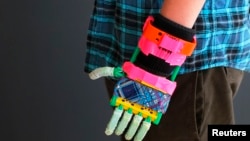Children love to play. Playing is how they grow and learn. But for some children, the idea of simple, joyful play time can seem very far away. These boys and girls may look differently than others, and not be able to move around as others do.
A rehabilitation center near Uganda’s capital is working hard to change that. It is bringing together doctors, volunteers and donations from around the world. They have established the first and only center for treating disabled children in Uganda.
The center is called Comprehensive Rehabilitation Services for Uganda, also known as CoRSU. The people there are concerned about the abilities of boys and girls -- not their disabilities.
On thick grass outside the main hospital, a mix of current and former patients do something others may take for granted – they are playing. They compete in sports, play games and even perform silly dances. The theme of the day is simply – “Let Them Play.”
This is a rare event for children who are missing arms or legs, have physically deformities or suffer from trauma.
The purpose of the event is to raise money for a new playground and sports field. Campaign organizers want to make the old playground into an area that is friendly to all sorts of disabled children.
Life for the disabled in Uganda is difficult. But for children it can be a shock some never overcome. Christine Tusiime is the principal physiotherapist at CoRSU. A physiotherapist often directs exercise programs for those affected by injury, sickness or disability.
Christine Tusiime talks about the problems facing the disabled in Uganda. She says that a disabled child may have trouble socializing or interacting with others. They are stigmatized -- meaning others look down at them.
“It stops them from playing like other kids, from socializing with other people. And usually when they tried to socialize, they are then stigmatized or called names depending on their disability… Of course from that, they tend to get low self-esteem, so they stop socializing and then they have psychological issues and challenges that come out from not being able to interact with kids their age, not being able to play, and generally not being able to go to school.”
CoRSU treats patients from all over Uganda, and nearby countries, including South Sudan and the Democratic Republic of Congo.
On the grounds of CoRSUr, there are areas where doctors can operate on patients. There also therapy rooms, housing and even a primary school.
Therapy can last from a few days to a few months. The treatments also involve support groups for parents and families. Sometimes even those closest to the child can have trouble understanding the disability.
The employees at CoRSU say they feel very good about their work.
Moses Dennis Kaweesa is a prosthetic technologist. He makes artificial body parts. He says he became interested in prosthetic development because he grew up with a family member who had lost a leg. He says children are some of his favorite clients.
Mr. Kaweesa says children learn to walk and even run quickly on artificial legs. He says the smiles and happiness of the children give him courage every day.
CoRSU receives no financial support from the Ugandan government. It depends on donations. Most of the money comes from overseas. CoRSU earns extra money by providing medical services to the neighborhoods surrounding the rehabilitation center.
I’m Anna Matteo.
*Lizabeth Paulat reported this story from Kampala, Uganda. Anna Matteo adapted it for VOA Learning English. George Grow was the editor.
_____________________________________________________________
Words in This Story
ability – n., the power or skill to do something
disability - n., a condition (such as an injury or something resulting from disease) that damages or limits a person's physical or mental abilities
take for granted – phrase, to expect something to be available all the time and forget that you are lucky to have it
deformity – n. a condition in which part of the body does not have the normal or expected shape
trauma - n. a difficult or unpleasant experience that causes someone to have mental or emotional problems usually for a long time
socialize - v. to talk to and do things with other people in a friendly way
stigmatized - v. to describe or identify as disgraceful; to describe or regard (something, such as a characteristic or group of people) in a way that shows strong disapproval
prosthetics technologist - n. A medical profession who makes artificial body parts
artificial - adj. not natural or real : made, produced, or done to seem like something natural
courage – n. the ability to do something that you know is difficult or dangerous







